5. The Winslow Boy
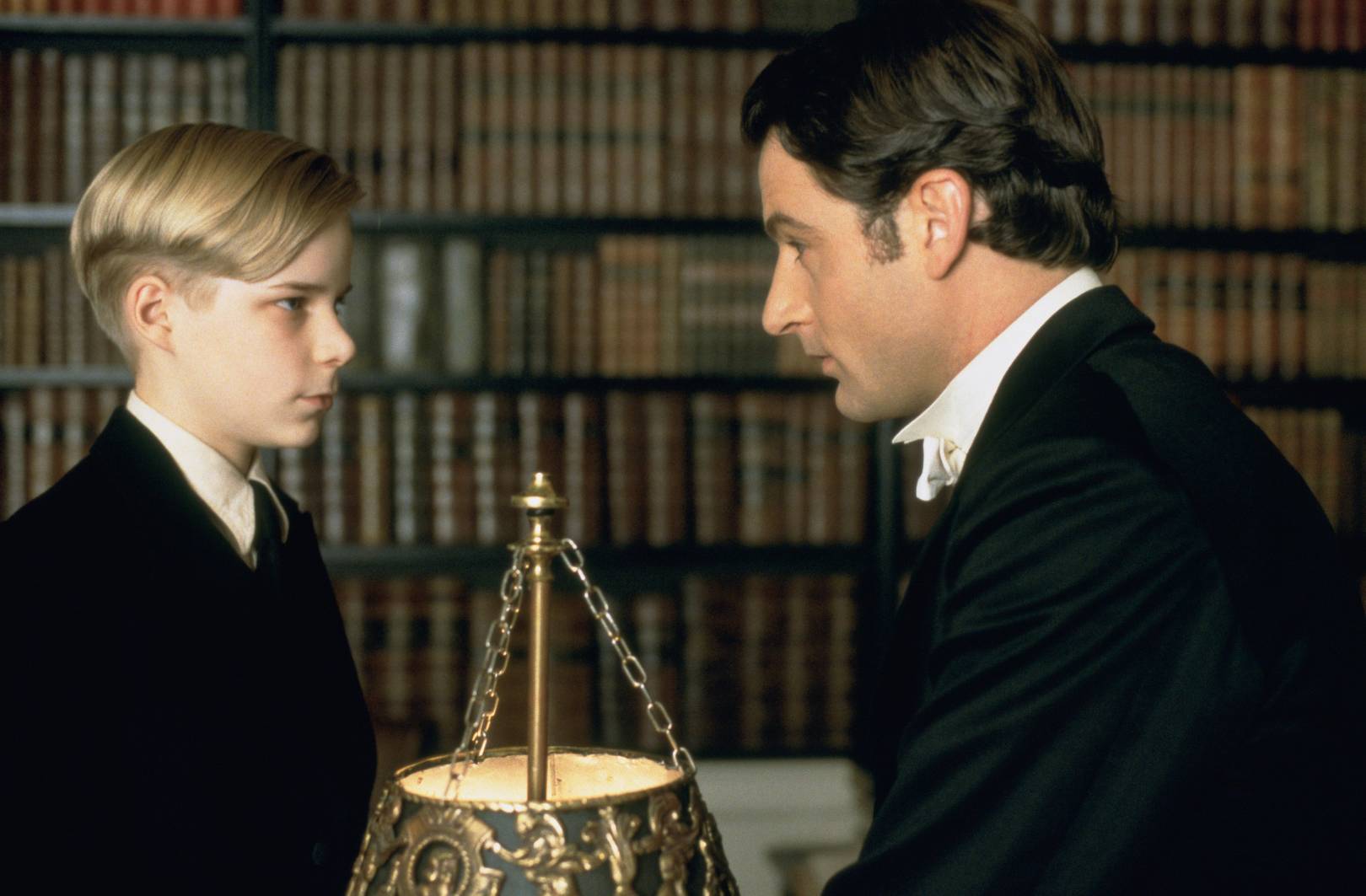
“The Winslow Boy” is certainly an oddity among Mamet’s directorial efforts. Stylistically, this film has none of the things we’ve come to expect from him; there’s no con, there’s no swearing, and there’s no Ricky Jay.
The characters don’t speak in American slang, they instead speak (very) proper English. Instead of his usual smooth jazzy score you’d expect to hear in the background of a low-down bar full of hustlers talking about their next score, there’s a sweeping orchestral score. A Mamet fan might feel he could skip this one, but they shouldn’t, because this warm little movie is an absolute gem in Mamet’s already impressive filmography.
Based on Terence Rattigan’s 1945 play, it tells the story of the dignified Winslow family and the sacrifices they must make to prove the innocence of one of their own. The father (Nigel Hawthorne, in absolute top form) is a banker who uses nearly all his financial resources to prove his son’s innocence from the supposed theft of a postal order. He enlists the help of a suave lawyer (a perfectly cast Jeremy Northam) to take the matter to court.
The consequences of his actions leads to his daughter (Rebecca Pidgeon, with a spot-on English accent and her presence being the only hint of this being a Mamet film) losing her suitor, and his eldest son (Matthew Pidgeon) losing his place at Oxford. The mother (an endearing Gemma Jones), on the other hand, becomes increasingly worried about her husband’s ailing health.
Mamet has often told stories about the willingness to do the right thing, and the personal sacrifices it entails. It is probably this theme that made the play so endearing to him.
Throughout the film, you really do feel the connection between each family member, and you believe the love they have for each other when they start sacrificing the many virtues of their lives, without it ever becoming schmaltzy as it would have been in the hands of a lesser director. This could not have worked as well without the proper chemistry.
“The Winslow Boy” is an often forgotten movie among Mamet affectionados, but it should not be dismissed. It’s a delightful little film, Mamet’s own “Pride and Prejudice”, and another example of Mamet’s multi-faceted talent.
4. Heist
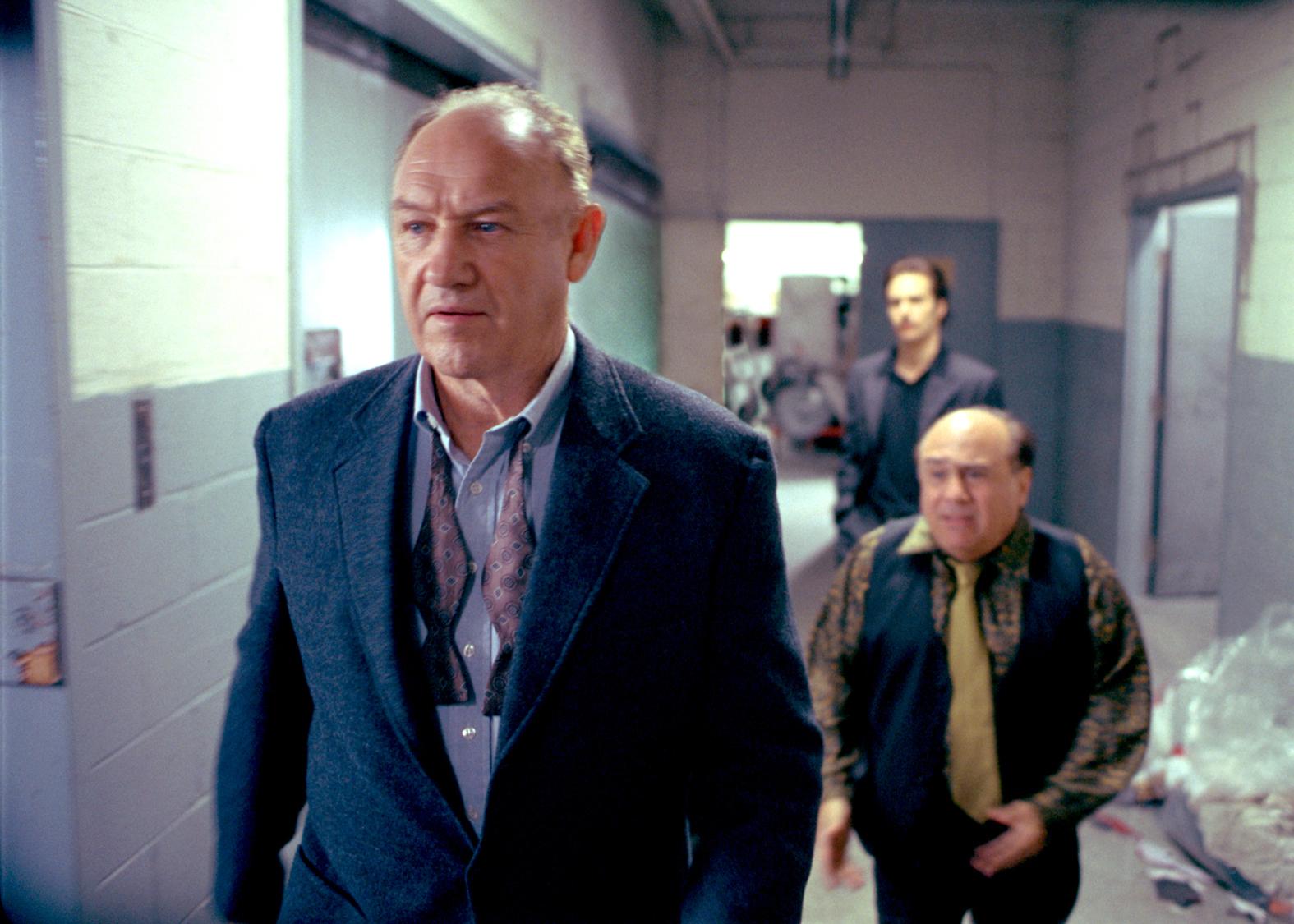
“Heist” is quite possibly the most entertaining film in Mamet’s repertoire. It’s pure unadulterated Mamet, and it has everything you can possibly love about his style, from the cool repetitive staccato dialogue, to the twist and turns and the presence of Rebecca Pidgeon and Ricky Jay. In addition, we have an amazing cast with Gene Hackman, Delroy Lindo, Danny DeVito, and Sam Rockwell.
Gene Hackman stars as Joe, a professional thief who wants to retire from the business after his face is spotted by a video camera, or as the film so infamously puts it, “he’s burned.” His financier, however, a crime boss named Bergman (Danny DeVito), forces him to do one more job, to which Joe reluctantly agrees. Bergman, however, doesn’t trust Joe and his crew (made up of Pidgeon and Jay) and forces them to add his nephew (Rockwell) to their team so he can inform on them. And then, as you would expect from Mamet, we get a series of power plays and double crossings.
This might be Mamet’s pulpiest film, but it’s undeniably cool. Hackman is his usual reliable self as the grizzled old-timer, the kind of role he has perfected for so many years now. He would have been perfect playing this part in the 70s; the only thing you would have to do is dye his hair grey. He’s both imposing when he needs to be, but there’s a glimmer of desperation in his eye as well, as his character knows that his time is running out.
Lindo is the coolest of the bunch; the chemistry between him and Hackman is impeccable, and it’s as if they have been working together for many years. Jay, as Pinky, has some of the best lines in the film. Normally he doesn’t have much more than a cameo in Mamet’s films, but here he has a big supporting part and manages to stand tall in front of giants like Hackman and Lindo.
DeVito chews the scenery as the main antagonist (this being the second time he’s delivering Mamet lines after “Hoffa”) and brings a lot of humor to the film as well, particularly during the middle of the final shootout when he’s hopelessly trying to compose the situation. The underrated Rockwell is wonderfully cocky, thinking himself to be the smartest of them all, even though he should know better.
“Heist” is especially great, thanks to the necessary humanity Mamet brings to the film. It could have been nothing more than a slick heist film, but you really feel the relationship between the characters, from the romance between Joe and Fran (Pidgeon) to his friendship with Bobby (Lindo). Even in this world of hustlers, humanity shines through. In the opening of the film Joe and Bobby have a discussion about what makes the world go around.
According to Joe it’s “gold”; when Bobby mentions that most people say “love”, Joe states that it’s the “love of gold” that makes our world twist and turn. In their final scene together, Bobby gives Joe the bank account information where Joe can transfer Bobby’s share of the loot. Even after everything they’ve been through, Bobby still trusts Joe to honor his agreement. I think Joe would agree that the mutual respect they have for each other seems a lot more valuable than his love for gold.
3. Homicide
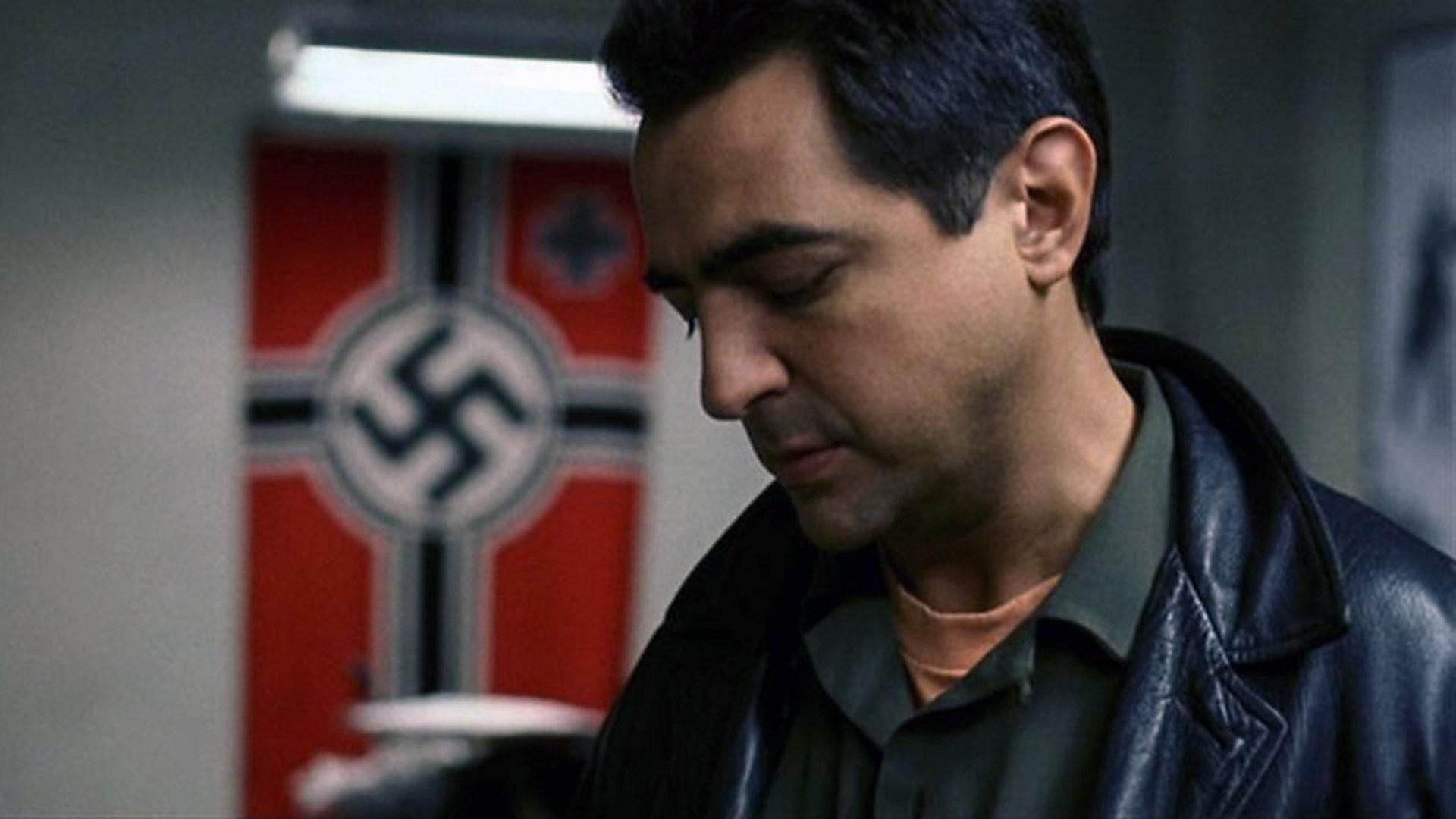
“Homicide” starts with a bang; a disastrous raid leads to the death of several officers and the escape of one key suspect. Seeing as they have a cop killer on their hands, the police want blood.
The two cops on the case are Bobby Gold (Joe Mantegna) and his partner Sullivan (William H. Macy). While they are chasing a lead, they become accidentally involved in a different murder scene.
The victim turns out to be an old Jewish woman, and as the woman’s son happens to be on the crime scene and sees that Bobby is Jewish as well, he uses his influence to make him the lead detective on the case, much to Bobby’s annoyance, who sees the case as nothing more than a simple robbery turned murder. However, the case takes on a much more personal side, and soon he isn’t just looking for the murderer, but for himself.
Mamet is a proud Jew and avid supporter for Israel. A collection of his of Judaism and its modern culture was released in 2006 called “The Wicked Son: Anti-Semitism, Self-Hatred and the Jews”. Naturally, for those who aren’t Jewish, the subject can be very alienating, and the same case could be made for “Homicide”.
This is not to say that the film cannot be enjoyed or understood if one is not Jewish, but it would certainly help. While many will deal with their own cultural identities, the Jewish identity especially is filled with rich history; both religious and intellectual, filled with persecution from all sides.
The character of Bobby Gold considers himself a cop, swearing an oath to the job, which he considers his higher calling. But as the movie progresses, he begins to wonder who he is and what he has been fighting for.
Mamet asks us this same question: who are you really fighting for? Are you fighting for yourself? Are you fighting for someone else? Or are you fighting for something greater? In this case, Bobby begins to wonder about himself; he’s always the first one to kick open the door, but why? Is he doing it for himself, or to prove something to his colleagues? What if he should have been fighting for something greater?
Bobby starts to believe that the woman was not merely murdered for the supposed fortune under her basement, but for her involvement as a gunrunner for pro-Israeli fighters. When he meets several of these figures (one of them played by Ricky Jay), he begs for their acceptance.
Yet when they ask him for an item in the evidence room, he cannot get himself do it because he swore an oath as a police officer. He becomes torn between two worlds; the job and his Jewish heritage. A Jew at a library even remarks that his badge is offensive; its pentagram shape is constricting to the earthly plain, while the Star of David can be deconstructed between both the earthly and heavenly plain.
In the end, Bobby has nothing, losing both his partner and best friend – which he blames himself for – and being rejected from both the police and the Jewish community. As a final irony, he discovers there was a no conspiracy at all. It was both his need for something greater and his guilt for betraying his heritage that had fooled him so.
Macy brings welcome support and has some of the film’s best lines, including: “Bob, I’m gonna tell you what the old whore said, and this is the truest thing I know: When you start cumming with the customers, it’s time to quit.”
Mantegna might be known to many as the voice of Fat Tony on “The Simpsons”, but he’s fantastic in this film, especially in the end, when he breaks down in front of his murderer partner; this pivotal role is played by the great Ving Rhames, and though it’s only a small part, it still makes quite an impression.
When Mantegna cries out that his life isn’t worth anything, you can’t help but feel for him. As a reply, Rhames’ character boils down his fate at the end: “well ain’t that a shame? Huh? After all your trials you come down to nothing.”
The film can certainly be a little too heavy-handed at times, but it never becomes preachy. It’s a fascinating character study of a man who strayed too far from himself, and when he tries to reclaim himself, it’s too far gone, way beyond his grasp.
2. House of Games
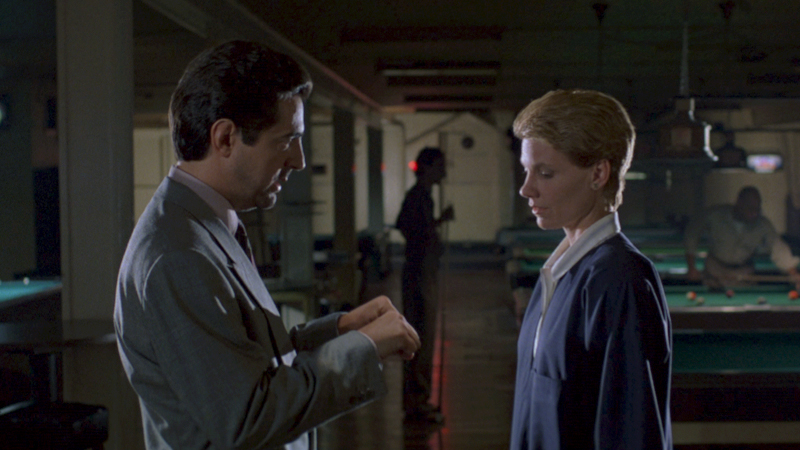
Mamet’s directorial debut, “House of Games”, is a classic in the con artist genre and deserves to be ranked among classics such “The Sting”, “Nine Queens”, and Mamet’s own “The Spanish Prisoner”. What sets the movie apart from these films – besides the fantastic dialogue, of course – is the emotional content, as it is as much a character study as it is a con artist film.
We follow Margaret Ford (Lindsay Crouse), a successful yet disillusioned therapist who gets involved with con man Mike (Joe Mantegna) after trying to persuade him to forgive the debt of one of her patients. Deciding to follow him in order to write about his exploits, she soon finds herself way over head when she joins Mike and his crew on a long con.
There’s a reality to the manner in which Mamet introduces us to this secret world. Mamet’s friend and co-star Ricky Jay is an experienced magician and an acknowledged expert on the art of the con, and his presence lends the film a certain authenticity. However, when Mamet pressed him for details on a short-term con, Jay refused to divulge secrets from his fellow hustlers.
The hustlers in this film are quintessential Mamet; men of loyalty, but should you get screwed, well, that’s just part of the game. You win some, you lose some. They are fast talkers and they look at you with empathetic eyes, but while they are doing it, they are playing you for your money. The culture of hustlers has rarely been as coolly portrayed as they are in this film.
“House of Games” was at first meant to have a larger budget with a star-studded cast. However, when Mamet took over the reigns from Peter Yates, he started casting his former wife Crouse and his friends. The film received rave reviews, though it was not a huge commercial success (a fate that would befall many of his films).
Looking back on this, it’s hard to believe that Mamet was a first-time director. He nailed his cinematic voice from the moment he stepped behind the camera. It has all his signature tropes, from the crafty plot and staccato dialogue to the many familiar faces, such as Mantegna and Jay; even William H. Macy pops up briefly as a potential mark. No one can call themselves a Mamet fan without having seen the film that started it all.
1. Glengarry Glen Ross
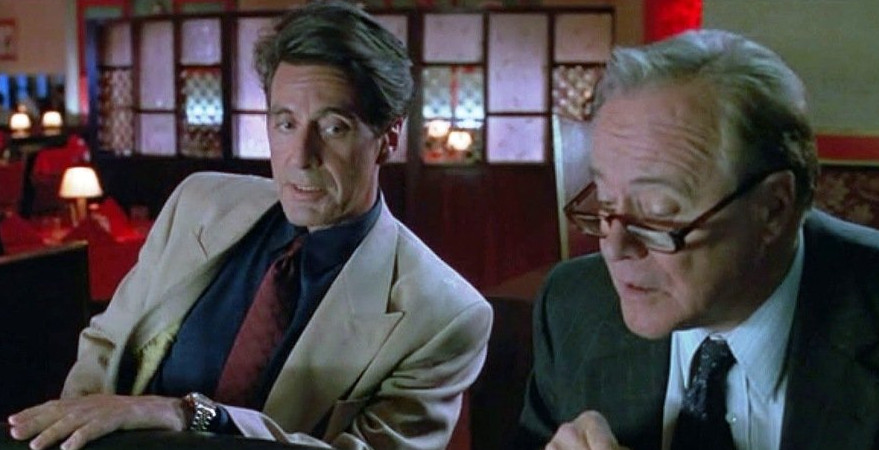
For many men, their job is their identity, and losing it would mean they have nothing to define themselves and so they become lost. It’s okay if you’re young and you have all the time in the world to seek another job, but when you’re middle-aged and just trying to get by, it’s a whole other deal. So goes “Glengarry Glen Ross”, the story of a group of middle-aged real estate salesmen desperately trying to keep their jobs.
The film opens with probably Mamet’s greatest creation, desperate real-estate salesman Shelley Levene. Shelley used to be a great salesmen, having earned the Nickname “The Machine” in the past for closing deal after deal. Now, however, he’s but a sad shell of his former glory.
Things turn even more desperate when a vicious sales motivator named Blake appears in their office, telling him and fellow salesman Dave and George that they have a week time to start selling their rotten leads. “First place is a Cadillac El Dorado, second place is a set of steak knives, and third place is you’re fired.”
“Glengarry Glen Ross” has arguably the greatest ensemble of actors ever onscreen. The actors were so impressed with each other that even on the days when they weren’t required on the set, they would still be there just to watch their fellow actors at work. We have Jack Lemmon owning the role of Shelley Levene.
Lemmon is one of cinema’s greatest actors and Shelley is arguably one of his greatest performances. Al Pacino plays Ricky Roma, Shelley’s opposite, a man Shelley used to be. We then have Ed Harris, Alan Arkin, Kevin Spacey, Jonathan Pryce, and Alec Baldwin, who all have their great little moments on film.
While Lemmon is certainly the greatest of them all, there’s so much to enjoy from each of the performances in this film. It’s filled with classic scenes and director James Foley perfectly replicates the power of the big screen, a task he initially didn’t want to take, believing he couldn’t do justice to the play.
Mamet’s screenplay was based on his own original play, which in turn was based on his own experiences while working in a real estate office. Mamet was not much of a salesman, as he said in his own words, “I kept identifying with the people on the other end, which is something you really can’t do.” But his experience led to one of his most famous plays, “Glengarry Glen Ross”, which would eventually win him a Pulitzer Prize.
The screenplay would become slightly superior than the play itself, mostly due to the addition of the character of Blake whose monologue sets the plot in motion. Blake’s monologue would become so popular it was added to the play.
Like much of Mamet’s work, it asks the question about what it means to be a man. There’s no feminine presence in the film; it’s about men trying to prove their manhood. You have the alfa-male Roma chastising Williamson, his office manager, for ruining a sale, screaming at him “whoever told you, you could work with me!?” Williamson, emasculated, shortly thereafter finds a weakness in Shelley, which he quickly exploits just so he can feel like a man; the strong eats the weak.
Even though the director himself is a staunch supporter of conservatism, it’s hard not to see this film as an indictment on the dehumanizing effects of capitalism.
What you have here is one of the most successful film adaptations of a play. You have a once in a lifetime cast who all have their moments of glory. It’s an exceptional film, and the greatest of all Mamet’s adaptations.
Author Bio: Chris van Dijk is a writer and a self-proclaimed cinematic-connoisseur who started his unhealthy obsession with film at a very young age. He’s famous for being an incredible slob, taking himself way too seriously and getting along brilliantly with anyone who agrees with him.